The Story of Geronimo
Jim Kjelgaard
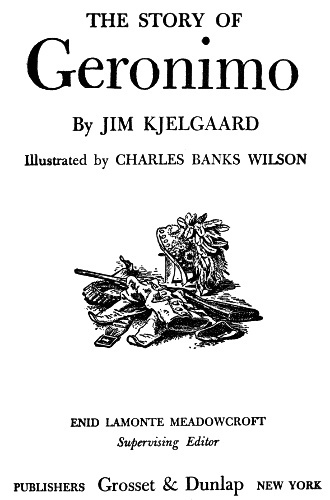
THE STORY OF
Geronimo
By JIM KJELGAARD
Illustrated by CHARLES BANKS WILSON
PUBLISHERS Grosset & Dunlap NEW YORK

SIGNATURE BOOKS GERONIMO
© JIM KJELGAARD 1958
PRINTED IN THE UNITED STATES OF AMERICA
Library of Congress Catalog Card No. 58-9837 The Story of Geronimo
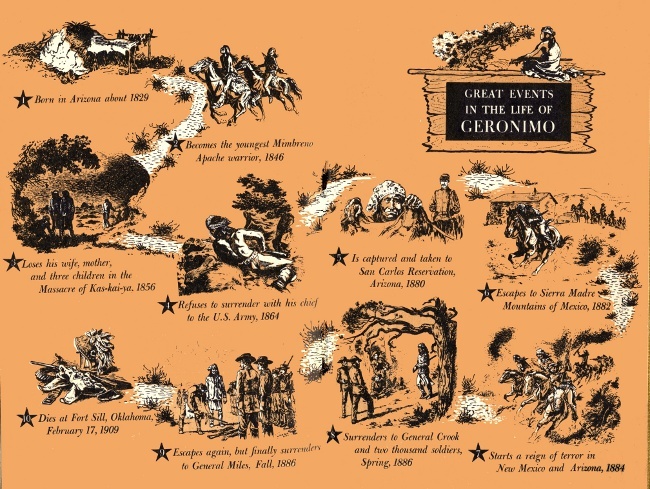
GREAT EVENTS IN THE LIFE OF GERONIMO
For
Eleanor Gefroh
who has been the dearest of friends to me and mine
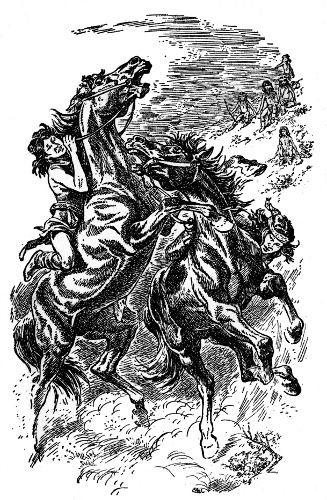
It seemed certain the two stallions must close with each other
Contents
| I | Duel by Stallion | 3 |
| II | Raiding the Papagoes | 13 |
| III | Alope | 28 |
| IV | Massacre | 39 |
| V | Flight | 51 |
| VI | Revenge | 59 |
| VII | The White Men | 71 |
| VIII | The Battle of Apache Pass | 80 |
| IX | A Wounded Chief | 90 |
| X | A Chief Dies | 99 |
| XI | Geronimo in Chains | 108 |
| XII | Flight into Mexico | 116 |
| XIII | Fortress Paradise | 127 |
| XIV | Chief Gray Wolf | 136 |
| XV | The Discontented | 145 |
| XVI | Hunted Like Wolves | 153 |
| XVII | A Gallant Soldier | 163 |
| XVIII | The Last Surrender | 170 |
Illustrations
| It seemed certain the two stallions must close with each other | FRONTISPIECE |
| The Papagoes saw him, raised their clubs and rushed forward | 19 |
| The horses snorted in alarm | 35 |
| Geronimo brought the skins of puma | 37 |
| He halted beside a Mexican | 46 |
| The first shell struck the breastworks | 87 |
| The Mimbrenos carried him over mountains and across deserts | 95 |
| "Look! Usan has smiled upon us!" | 122 |
| Geronimo had cut the wire with his axe | 151 |
THE STORY OF Geronimo
CHAPTER ONE
Duel by Stallion
Geronimo crawled up the hill so carefully that no stalk of grass moved, and no bush quivered. A pair of crested quail, feeding on insects in the grass, merely glanced up when he passed and went on feeding. Geronimo reached the top of the hill and crouched down in the grass.
Beyond were more hills, the near ones low, rocky, and given more to shrubs and grass than to trees. Geronimo's eyes strayed across the Arizona landscape to the east. There lay No-doyohn Canyon, where Geronimo had been born in 1829, just twelve years earlier. There his father had died when Geronimo was five years old. In the far distance beyond the canyon, tall, pine-clad mountains rose.
Geronimo looked down the slope on a wickiup. This Apache house was built of poles thrust into the ground, with deer skin walls and a smoke hole in the center of the roof. It was the home of Delgadito, a mighty chief among the Mimbreno Apaches, the tribe to which Geronimo belonged. Delgadito was so mighty that only the great chief, Mangus Coloradus himself, outranked him.
Delgadito owned many horses. Most of them grazed by day in pastures far from the village. But his black war stallion, his nimble-footed gray hunting horse, and the mare that his wife rode were only absent from their picket ropes when a rider was using them.
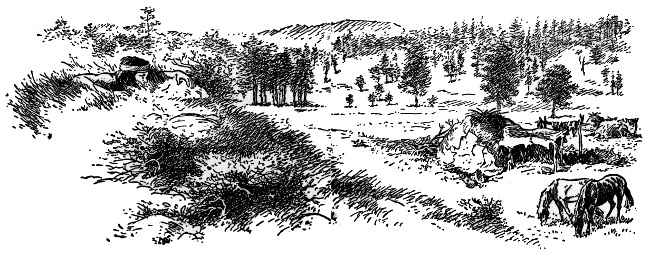
Now the gray hunting horse was gone, which meant that Delgadito was out after deer. But the mare and the stallion were still there. Geronimo had come to steal the war horse. This, however, was not the time to do it.
The mare's presence proved that Delgadito's wife was home. If she saw Geronimo stealing the war horse she would tell her husband. The punishment sure to follow would be harsh and long remembered. Delgadito knew how to use a switch on headstrong boys. Geronimo crouched in his hiding place, waiting.
Soon Delgadito's wife came from the wickiup, mounted her mare, and rode away. Geronimo rose and walked swiftly down the hill.
The stallion raised its head and watched with eyes that were fearless and questioning. Geronimo grasped the buckskin tie rope, and was drawing the horse to him when—
"You leave my uncle's war horse alone!"
A girl had come from the wickiup. Geronimo was so interested in the horse that he did not even know she was near until she spoke. Her name was Alope, and she was Delgadito's niece. Geronimo thought she was so lovely that the most dazzling maidens of the Mimbreno or any other tribe were drab beside her. When grown, such a girl would be too good for any warrior. Only a chief would be worthy to have her as his wife.
Geronimo said, "I must have this stallion, Alope."
"Why?" Alope asked.
"I must fight a duel of stallions with Ponce, the son of Ponce, and the only stallion among my mother's horses is too old to fight," Geronimo said.
Alope asked, "Why must you fight such a duel with young Ponce?"
"He gave me the lie!" Geronimo said angrily. "I killed three deer with my bow and arrows. Ponce said I found them dead!"
"Twelve-year-old boys are not supposed to be able to kill deer," Alope said.
"I did!" Geronimo insisted.
"I believe you," Alope said. "But these duels are dangerous. You know the elders have forbidden them."
Geronimo patted the stallion's cheek.
"If the elders do not know a duel is being fought," he said, "they can do nothing."
"And if my uncle's war horse is killed," Alope told him, "he'll stake you out on an ant hill and let the ants devour you."
Geronimo said, "I'll gladly accept any punishment after I have fought this duel, but I must fight!"
"What if you are killed?" asked Alope.
"I won't be. Among all his father's horses, the son of Ponce shall find no stallion to equal this one, and I am a much better rider!"
Alope said, "My good sense bids me run and get my aunt, but my heart tells me to speed a warrior on his way. I'll not tell, but I'll tremble for what will happen to you should my uncle's war horse be killed or hurt."
Geronimo slipped the tether rope, grasped the rein, and vaulted happily to the back of the mighty horse. Though the stallion wanted to gallop and Geronimo burned to test the speed and fire of such a mount, he held him to a walk. There was a fight coming up. The stallion must go into it rested.
At the same time, it was a glorious feeling just to be on such a stallion. All Apaches could ride, but few were master horsemen. Geronimo had started riding the village colts when he was so small that it was necessary to lead his mount beside a boulder or stump from which he could scramble onto its back. He seemed born to ride. Not half a dozen men in the village could stay on the back of Delgadito's war horse. But Geronimo was riding him.
After twenty minutes the Indian boy looked down on the secluded swale where the duel would be fought. He and Ponce had chosen a battle ground far enough from the village so that the elders would be unlikely to interfere. Young Ponce was waiting there with one of his father's best horses, a fiery bay that had already slain a half dozen rivals.
Though the elders knew nothing of the duel, a crowd of boys ringed the chosen arena. They were tense with excitement, but they did not yell and shout as white boys would have. And all stood far enough away so that they could escape if either stallion charged toward them.
As Geronimo rode down the hill, Delgadito's war horse caught scent of the other stallion and screamed his challenge. Ponce's bay answered, and the two stallions rushed each other. Quickly Geronimo planned his battle.
Such duels were a common way for Apache boys to settle arguments. They often resulted in the death of a horse, a rider, or both. When they did, it was usually the rider's fault. Geronimo planned on using his riding skill to make a fool of Ponce, and he intended that nobody should get hurt.
Just as it seemed certain the two stallions must close with each other, Geronimo turned Delgadito's war horse so expertly that they passed within inches. At this wonderful display of riding skill, an excited murmur of admiration rose from the watching boys.
Geronimo turned back, this time wheeling right in front of Ponce's angry stallion. He swerved to come in to the side. Ponce's bay reared and pawed the air with skull-crushing front hoofs. The watching boys gasped. But just as it seemed certain that Geronimo would be killed, he leaned over and escaped by the width of a hair.
Suddenly, to Geronimo's vast surprise, Ponce wheeled his stallion and galloped away as fast as his bay could run. Deciding to chase him on Delgadito's war horse, Geronimo was even more astonished when a shrill whistle split the air.
The war horse whirled and trotted obediently to—Delgadito himself! For the first time Geronimo noticed that the watching boys had disappeared too. He alone had been so interested in the duel that he had failed to see Delgadito come. The chief's eyes blazed with anger.
"Why do you fight a duel of stallions?" he demanded.
"The son of Ponce gave me the lie!" said Geronimo, sitting erect on the war horse. "I killed three deer with my bow and arrows! Young Ponce said I found them dead!"
"Come with me!" commanded Delgadito.
He turned toward his gray hunting horse, which was rein-haltered near by and which had a buck strapped behind the saddle. Without a word or a backward glance the tall chief mounted and rode at a walk in the direction of his wickiup.
Though he shivered inwardly, Geronimo did his best not to show it as he followed. Nor was he sorry that he had stolen the war horse. He had acted as a warrior should; he would take his punishment like a warrior.
When they reached the wickiup, they dismounted and Delgadito tethered both horses. Then he removed his bow and quiver of arrows from the hunting horse, took a single arrow from the quiver, and gave the arrow and the bow to Geronimo.
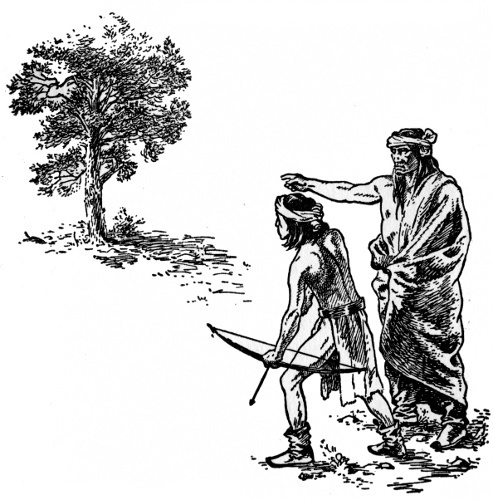
"Killer of deer, I would see you shoot," the chief ordered.
Geronimo fingered the unfamiliar weapon. "What target?"
Delgadito nodded at a pine about twenty yards away. "The knothole."
Geronimo nocked the arrow, raised the bow, and needed every ounce of his strength to draw it. This was a man's weapon, with a much heavier pull than the bow he had made for himself. But he did not shoot until he knew he was on target.
The arrow's shaft quivered as its copper point bit deeply into the knothole.
Delgadito said, "I saw you ride, and now I have seen you shoot. You told no lies. When the sun has risen three times more, I will lead a raid against the Papagoes, for we should steal more horses. You will ride with us."
Delgadito turned and entered his wickiup to indicate that Geronimo was dismissed. But for a full two minutes the dazed youngster did not move. At last, at long last, his fondest dream was coming true.
He was to be a true warrior.
CHAPTER TWO
Raiding the Papagoes
Three days later, at sunrise, an excited Geronimo sat nervously on his mother's aging stallion and waited for the raiders to start. Besides Delgadito, who was the leader, and Geronimo, there were four braves named Nadeze, Sanchez, Tacon, and Chie.
The dome-shaped wickiups where the villagers lived were softly beautiful in the early morning light. Here and there the embers of last night's cooking fire—for in this fine spring weather the Apaches did most of their cooking out of doors—glowed like a star fallen to earth. But except for the sentries who had been up all night, and the raiders about to set forth, the village slept.
When all the raiders were mounted, Nadeze and Sanchez left the others. Presently they returned driving a dozen loose horses among which was a beautiful spotted apaloosa. This horse had belonged to a shaman, or medicine man, of the White Mountain Apaches and had been taken from him in a night raid.
It was always necessary to have extra horses when going into enemy country for any reason. They could serve as remounts. If there was no other food they could be eaten, or they could be traded if there were any opportunities for trading.
But Geronimo wondered why Nadeze and Sanchez had included the apaloosa. The spotted horse was famous throughout the land. Even the Papagoes and pueblo-dwelling Zuñi knew him, and whoever saw him would surely send winged words to the shaman.
"Then a war party from the White Mountain Apaches will come to rescue their medicine man's horse," Geronimo thought. But he asked no questions. Surely Delgadito knew what he was doing.
Nadeze and Sanchez drove the loose horses on at full gallop, for the sooner the animals were tired the sooner they would be willing to stay with the rest and the less trouble they would cause. The other raiders rode out from the village more slowly.
An hour later they overtook Nadeze and Sanchez, and the driven horses, now too tired to run. They fell in at the rear and seemed satisfied to stay there. Geronimo felt a rising anxiety.
He had always imagined raiding to be a stealthy business. These men laughed, shouted, and gaily mimicked a coyote that moaned from a nearby ridge.
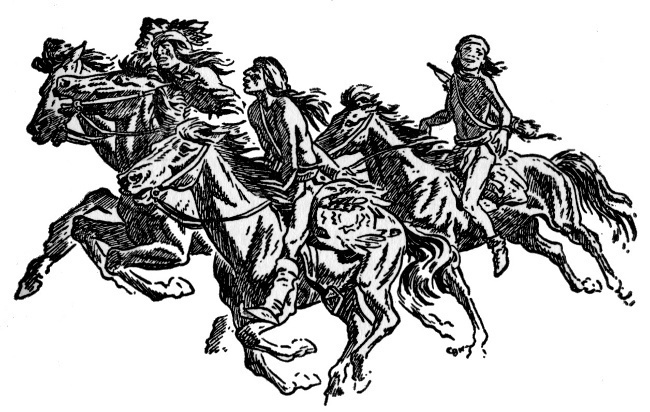
Presently lithe, slim Tacon challenged fat Chie to a race. Whooping at the tops of their voices, they were off. Geronimo stopped worrying. Delgadito was too experienced a raider to do anything foolish. If he let the warriors act as though there were no enemies within twenty miles, then there were none.
That night they camped on top of a rocky hill from which they could see in all directions, and they were careful to put all fires out as soon as darkness fell.
"Fire may be seen for a long distance on a dark night," Geronimo said to himself. "That is why they were put out."
The next morning the raiders rode on, and not until midafternoon did they make the slightest attempt to hide themselves. But when they finally halted under a cloud-ridden sky, there was a change in every man.
This was desert country, and they stopped in a cluster of rocky hills. Delgadito and Chie dismounted and climbed the tallest hill to scout from its summit. Soon they returned and told the others to dismount too. Tether ropes were slipped about the necks of the loose horses, which were now led by the raiders as all went on quietly.
A half hour later the raiders made a second stop in a dry wash. The banks of this desert creek bed were about four feet high and rimmed by cactus and palo verde trees.
Sanchez and Delgadito felled one of these trees with copper hatchets, cut off two stout chunks, and tied either end of a long rawhide thong to them. Then they stretched the thong as far as it would reach, and buried the chunks in the earth, at the bottom of the creek bed. Careful to place a gentle horse between two quick-tempered mounts, they tied all animals to this picket line. This done, all got their weapons and started up over the wash.
Geronimo ran happily for his own bow and arrows and followed. Suddenly Delgadito turned, put the palm of his hand against the youngster's face, and pushed so hard that Geronimo found himself seated in the bottom of the wash.
"Stay here to watch the horses," the chief growled.
"But I'm a warrior too!" Geronimo protested.
Delgadito growled again, and amused smiles flitted over the lips of the others. The raiders melted into the desert.
Flames of anger scorched Geronimo's cheeks, and rage ate at his heart. He had a fierce desire to pursue and kill Delgadito in revenge for being knocked down. But he knew that he must obey his chief. And he found it much more satisfactory to be guarding warriors' horses than to be playing children's games in the village.
Geronimo pillowed his back against a boulder and for a while never took his eyes from the horses. Then it began to seem foolish to watch them at all. The animals were standing quietly, and the idea that an enemy might come into the creek bed seemed unlikely. Presently Geronimo went to sleep.
Some time later he awakened. At first he thought he had been disturbed by the deepening clouds and a feeling that rain would soon fall. Then he peered down the wash.
Two nearly naked Indians carrying war clubs were stalking the horses and were only about forty yards from the nearest animal. Their clubs, the way they wore their straight black hair, and their tattooed faces stamped them as Papagoes. It was plain to see that they intended to steal the horses.
When he was certain that neither Papago was looking in his direction, Geronimo slung his quiver of arrows over his back. Taking his bow in hand, he crawled swiftly to and under the nearest horse.
The horses were not in an even line, but all stood perfectly still because they were interested in the Papagoes, and their legs formed a rough tunnel. Geronimo crawled down it. Reaching the last horse, he stopped and licked dry lips.
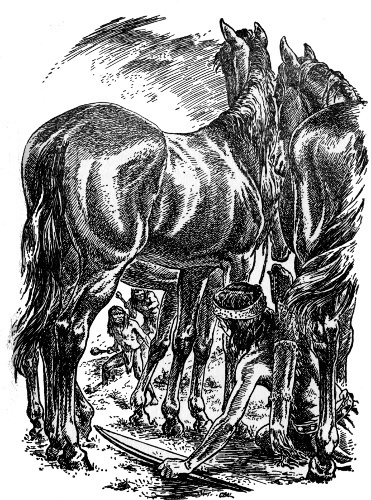
The Papagoes saw him, raised their clubs and rushed forward
He wished Delgadito or any of the others were there. It was one thing to dream of becoming a warrior and quite another to face the enemy. What should he do now? Then the Papagoes saw him, raised their clubs and rushed forward, and there was only one thing he could do.
Geronimo plucked an arrow from his quiver, nocked it, drew his bow, took careful aim at the nearest Papago, and shot. The Papago was hit squarely in the heart. The only sound as the man fell was a jarring thud when he struck the ground. His companion turned to run.
Forgetting to nock another arrow, Geronimo crawled weakly from beneath the horse and for a few minutes sat shivering. Then he remembered that, though he was still a boy, he would soon be not just a warrior but an Apache warrior. Forcing himself to rise, he walked over to look at the dead Papago, and told himself that he was glad he had put an end to another enemy of the Apache. But he was just as happy that he had not killed the second Papago too.
Before long a black horse, flanked by a gray and four bays, jumped down into the wash, ran across it, and stopped. They stared back in the direction from which they had come, and the tethered horses raised their heads to stare too. Geronimo thought that the black was a wonderful stallion and was surely stolen from some Mexican rancheria because no Papagoes bred horses so fine.
Now more horses came galloping over the desert until there was a herd of about eighty milling around in the wash. For the most part they were scrawny Papago ponies. But Geronimo saw one more fine stallion, a dark gray with black spots.
Riding stolen ponies, which they guided without help of saddle or bridle, Delgadito and his raiders were on the heels of the last horses. As their mounts jumped into the wash they slid off. Delgadito made his way to Geronimo and looked down at the dead Papago.
"How is this?" the chief asked.
"He would have stolen our horses," Geronimo replied.
"Was he alone?"
"There was another," the boy admitted. "I did not kill him."
"You should have," Delgadito scolded. "But come now and mount."
Geronimo ran with him to the picket line and mounted his mother's old stallion, then he was astounded to see Delgadito take time to strip saddle and bridle from his own horse and put them on the apaloosa. Geronimo marveled. This was enemy country and, when the Papagoes discovered that some of their horses had been stolen, they were sure to launch a hot pursuit. But Delgadito seemed as calm as he had ever been at home in his own wickiup.
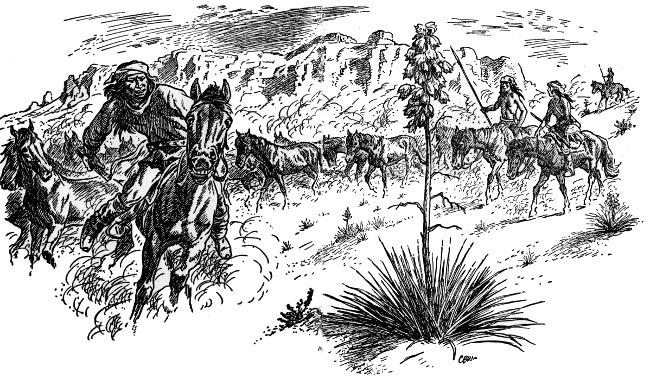
Mounting the apaloosa and whooping at the top of his voice, Delgadito charged the herd. The other riders took off, one after another, and drove the horses full speed straight north. This puzzled Geronimo. Finally he rode over to talk with Nadeze.
"Why do we go north?" he asked. "Our home is almost due east."
"Worry not and question not," Nadeze said coolly. "Look and learn."
Always at full gallop, Delgadito was racing from one end of the line to the other. The apaloosa already had run at least six times the distance any other horse had traveled.
About an hour and a half later Delgadito caught his own horse and transferred saddle and bridle from the apaloosa to him. The exhausted apaloosa staggered ten feet to stand with head drooping. Geronimo finally understood.
Beyond any doubt, Papago trackers were already on the trail of Delgadito's Mimbreno raiders. They could not fail to find the weary apaloosa and they would know its owner was the shaman of the White Mountain Apaches. They would also see that the stolen horses had been started northward, toward the home of these Apaches. Thus the Papagoes would think that they had been raided by men from the White Mountain tribe and they would seek revenge on them, rather than on the Mimbreno Apaches.
"We have a wise chief," thought Geronimo, as Delgadito's plan became clear to him.
Just then Delgadito said, "Chie, continue northward with thirty of the more worthless horses. Leave a plain trail, as though we were stricken with panic. But drive the horses back and forth so it will appear as though there were many more than thirty. Run as soon as you see pursuers."
Chie nodded, and the rest of the men started dividing the remaining horses into smaller groups.
"Why do we do this?" Geronimo asked, riding along beside Nadeze.
"It is easier to hide the trail of a small group of horses," said Nadeze. "And the Papagoes will find it much more difficult to track us since we will take each herd in a different direction before swinging back to our village."
"Do I drive some?"
"You are too anxious, stripling." Nadeze was far more respectful since Geronimo had slain the Papago. "You will ride with one of us."
Suddenly the rain clouds which Geronimo had noticed earlier loosed an earth-battering torrent. The raiders smiled. Usan, god of their tribe, had indeed blessed them. Though the Papago trackers would certainly find the apaloosa, they would never discover where the rest of the horses had gone after a storm such as this one.
Driving all the horses ahead of them through the pouring rain, the raiders turned homeward.
In bright sunlight next day, the stolen Papago horses cropped grass on the slope opposite Delgadito's wickiup. Geronimo listened anxiously while Delgadito, as was the right of a chief who led a raiding party, divided the plunder.
The leader reserved twenty horses for himself, and the twenty he chose included the two fine stallions. Then he gave smaller numbers of horses to the four men who had gone with him. The number each received depended on how hard he had worked to make the raid successful. Next came a just share for all families who had no one to steal horses for them.
Geronimo's heart sank as the horses were given away. He had hoped to get something for himself, but now the only horses remaining were a dozen or so fit only for the cooking pot. Delgadito declared them as such. Then he announced, so that all could hear:
"I give part of my portion, the black stallion and the gray stallion with black spots," he swung to Geronimo, "to an Apache youth who deserves them because during this raid he behaved like a warrior."
For a moment Geronimo was too surprised and delighted to move. Then he tilted his head, squared his shoulders, and went proudly forth to claim his prizes.
CHAPTER THREE
Alope
It was spring in the year 1846, five years after Geronimo's first raid. Ten miles south of the Arizona-Mexico border, Geronimo sat silently on the summit of a low hill. His knife was on his belt. His muzzle-loading rifle, powder horn, and bullet pouch were in easy reach. A red blanket was draped over his body, which was naked except for breech cloth, moccasins, and the warrior's headband that bound his black hair.
Two young warriors, Zayigo and Pedro Gonzalez, sat beside him. Both were older than Geronimo. Yet both had chosen to let the seventeen-year-old warrior lead this raid into Mexico because of his cunning and courage.
Now they were a little uneasy because of their leader's silence. Usually Geronimo loved to talk, and he was already a leading orator among the Mimbreno Apaches. When he was least talkative, he was most dangerous. Finally Zayigo said impatiently:
"We sit beside the youngest Mimbreno Apache ever to become a member of the Council of Warriors. Yet he sulks like a scolded child. It ill befits him."
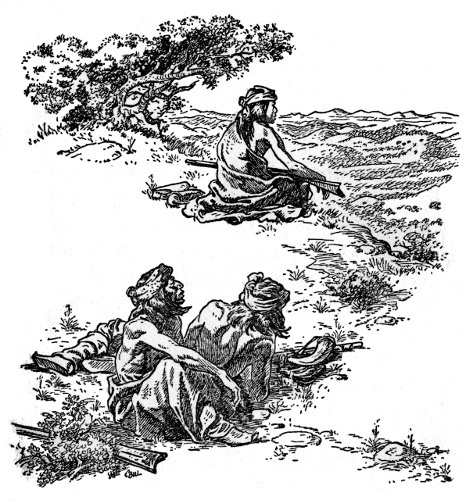
"Aye," Pedro Gonzalez agreed. "Since leaving the Mimbreno village, Geronimo, you have smoldered like a fire that is not quite able to burst into flame. Is it because some warriors spoke against you when they met to determine whether you might be admitted to the Council?"
"I care not who speaks against me," Geronimo said sourly. "Any who consider me unworthy of being a Mimbreno warrior I'll fight gladly."
"Those who did not want to admit you to the Council of Warriors never questioned your bravery or your skill in battle," Zayigo said quickly. "They said only that you are reckless and headstrong, and that trouble goes where you do because you never reckon the odds."
"There are some Mimbreno warriors who have the cowardly souls of Mexicans," Geronimo grunted. "And I do not mean that you are a coward, Pedro."
Pedro Gonzalez said quietly, "Mexican I was once. Apache I am now."
That was true. Captured in Mexico when he was five years old, Pedro had been adopted by an Apache family. He had taken so readily to Apache ways that he was now one of their finest and fiercest warriors. He spoke again:
"If you care not because some spoke against you, what is the trouble? It is no pleasure to go raiding or anywhere else with one who does little except stew in his own anger."
Geronimo said bitterly, "Ne-po-se was one of the men who spoke against me."
"The father of Alope does not like you," Zayigo said. "But that is no news in the Mimbreno village. Ne-po-se does not care to have Alope marry a mere warrior when it is possible that a chief will offer five horses in exchange for her."
For a moment Geronimo did not answer. For five years he had watched Alope become lovelier each year. Her image accompanied him wherever he went by day and haunted his dreams by night. He was as deeply in love as a young man can be.
He said finally, "When I became a warrior in full standing, I went to Ne-po-se and asked for Alope. He sneered at me, and said to come back when I could offer ten horses for his daughter's hand."
"Ten horses!" Zayigo said in astonishment. "That is unheard of, even for such a bride as Alope! What do you intend to do?"
"Pay for my bride what she is worth," Geronimo said. "That is why we are in Mexico, where there are plenty of horses for the taking."
He spoke more easily, for talking about his troubles had made them seem less. Zayigo and Pedro Gonzalez smiled, their white teeth flashing in the darkness.
"Now you talk as the leader we hoped we were following," Pedro Gonzalez said happily. "Of course there are plenty of horses in Mexico. And when it comes to stealing horses, no warriors are more clever than Geronimo. You shall gain the price of your bride."
"I shall have the price or I shall not return to the Mimbreno village," Geronimo vowed. "And I know we shall return for we go against Mexicans.
"I think it must be true that something in the food they eat or the water they drink turns the marrow of Mexican men's bones to jelly as soon as they become men. Captive Mexican women fit very well into our tribe, as do children if taken young enough. The men do little except tremble with fear, and that is why it is better to kill than capture them."
Pedro Gonzalez laughed joyously. "It is long since I have fought Mexicans. Let us hope this is a good fight."
They curled up in their blankets and slept. The night was still black about them when they rose to go on. Traveling at a loose-legged gait that covered the ground with amazing speed, they were many miles from their camping place when the sun rose. They stopped to nibble parched corn from pouches that hung at their belts, rested less than five minutes, and went on.
Geronimo, who had been this way many times and who also had a splendid sense of direction, led the others through steep-walled canyons and over brush-grown hilltops. By midafternoon they were looking from the top of a hill down on the rancheria they intended to raid.
The house and other buildings were built of adobe, or sun-dried brick. To one side were extensive corrals made of poles that had been laboriously hauled from some river bottom or other where trees were plentiful. There were about fifty horses in the corrals.
The three Apaches crouched in the brush and bided their time. They were heedless of the sun that burned down upon them. Thirst that would have driven a white man mad bothered them not at all. They were trained to endure thirst.
An hour before dark, several Mexican riders came with a herd of forty horses. They put them in the same corral where the fifty were already confined, and turned their own saddle mounts in with them. Two more riders came, stripped saddles and bridles from their mounts, and shut them in the corral. Then all the Mexicans went into the house.
Night fell before the three Apaches stirred. Geronimo gave his orders.
"Zayigo and Pedro, keep those in the house from coming out. I go to the corral."
Geronimo slipped away in the darkness. He could no longer see the corral, but his sense of direction was so sure that he went exactly to it. The Mexicans had draped their saddles over the top rail and hung their bridles on the saddle horns. Taking no saddles, for all three raiders were expert bareback riders, Geronimo looped three bridles over his shoulder and entered the corral.
The horses snorted in alarm when they got his scent, then wheeled to run to the corral's far side. Geronimo did not hurry even slightly, for in the first place any quick move would frighten the horses. In the second place, with Zayigo and Pedro Gonzalez watching the house, he was not afraid that the Mexicans would come. In the third place, Geronimo had done this so many times that he knew exactly how to go about it.